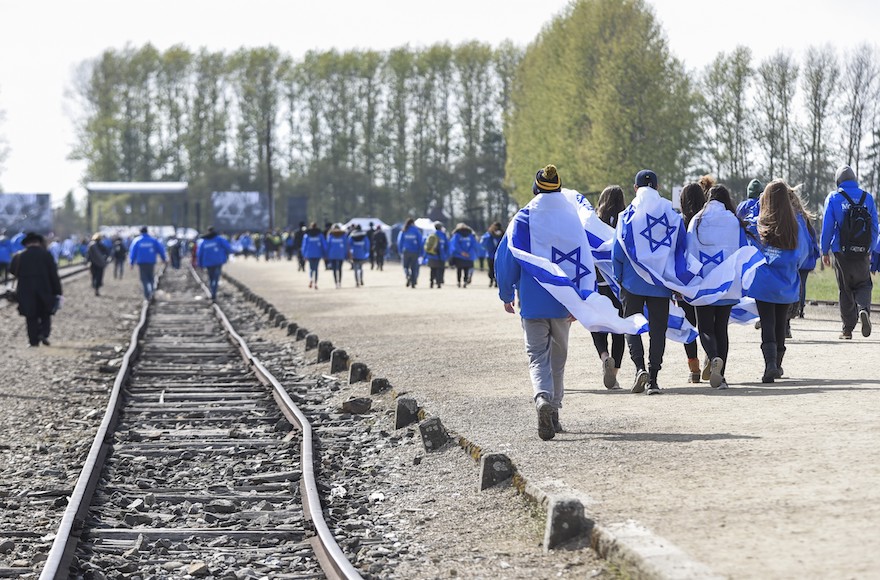Israel suspends school trips to Poland, citing interference in content and security issues
The move, which affects 7,000 students this year, follows a diplomatic crisis between the two countries on how to talk about the Holocaust.

March of the Living participants carrying Israeli flags at the former Nazi Auschwitz-Birkenau concentration camp at Oswiecim in Krakow, Poland, April 24, 2017. Photo by Getty Images
(JTA) — Israel’s education ministry has suspended school trips to Poland amid disputes with authorities there, possibly cancelling plans to have 7,000 students visit former death camps this summer.
The ministry’s statement Tuesday cited disagreements with Polish authorities over security for the trips — a possible reference to an issue involving armed guards accompanying the delegations.
But on Wednesday, Foreign Minister Yair Lapid cited disagreements between Israelis and Poles on how to talk about the Holocaust as one reason “jeopardizing school trips,” Haaretz reported.
“The Poles wanted to determine what is allowed and what’s not allowed to tell Israeli children traveling to Poland. We will not agree to this,” the newspaper quoted Lapid as saying.
The disagreements, he added, are connected to a law passed in Poland in 2020 that made it illegal to blame the Polish nation for Nazi crimes. Israel protested the law, which some Holocaust scholars warned would limit free speech and academic research on collaboration with the Nazis by thousands of Poles.
“Part of the implications of this legislation is the fact that the Poles wanted a say in the content given to the delegations. It certainly jeopardizes the trips of this summer. It’s a decision made by the education minister originally but clearly this has diplomatic consequences,” Lapid said.
A Polish government spokesperson confirmed to Haaretz that Poland wishes to change the content on school trips at Auschwitz and other concentration, death camps and heritage sites connected to World War II and the Nazi occupation of Poland.
Poland is asking Israel to teach about the Holocaust “with a wider historical perspective” free of “negative stereotypes about Poland and Poles,” Haaretz quoted the spokesperson as saying. “We want to increased the participation of Polish figures in preparing the groups and during the visits to the heritage sites, including through the engagement of Polish guides.”
This article originally appeared on JTA.org.
A message from our CEO & publisher Rachel Fishman Feddersen
I hope you appreciated this article. Before you go, I’d like to ask you to please support the Forward’s award-winning, nonprofit journalism during this critical time.
We’ve set a goal to raise $260,000 by December 31. That’s an ambitious goal, but one that will give us the resources we need to invest in the high quality news, opinion, analysis and cultural coverage that isn’t available anywhere else.
If you feel inspired to make an impact, now is the time to give something back. Join us as a member at your most generous level.
— Rachel Fishman Feddersen, Publisher and CEO